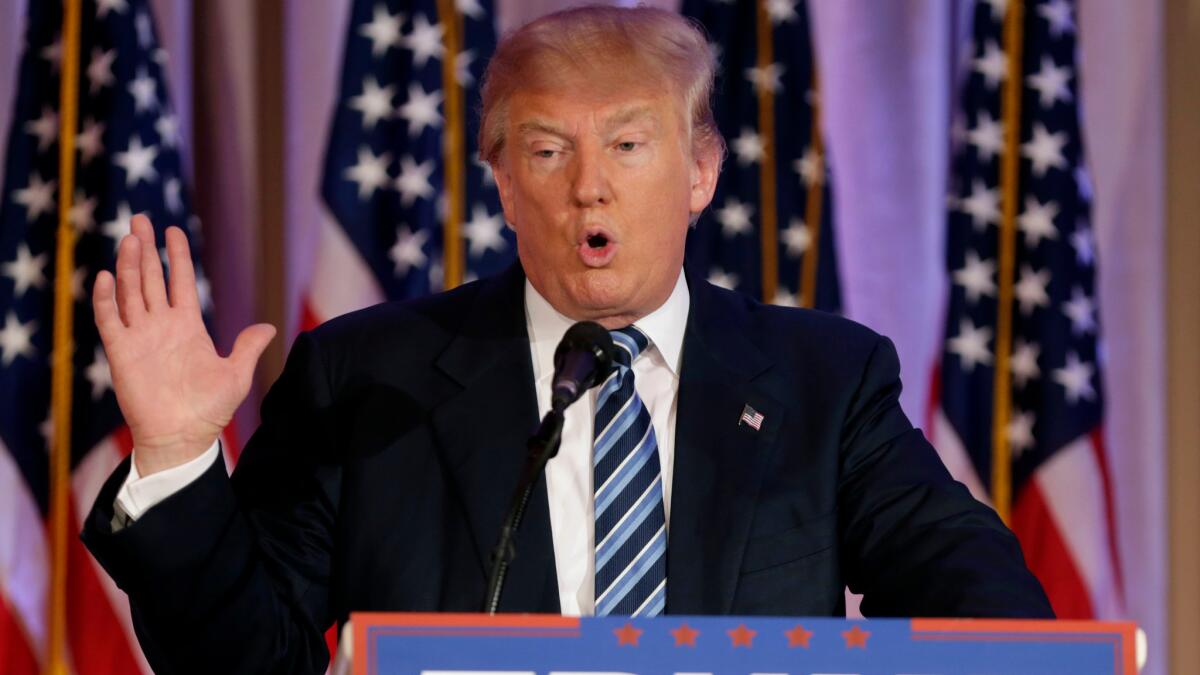Donald Trump should read Robert Frost’s poem ‘Mending Wall’

In the late summer of 1962, poet Robert Frost was invited to visit the Soviet Union. During the visit, he read at a Moscow library. The poem he chose was “Mending Wall,” which is ostensibly about two New Englanders setting out to repair the stone barrier between their farms.
In the first line of the poem, the narrator famously expresses a hesitation about this task: “Something there is,” he announces, “that doesn’t love a wall.” You can be sure that, for the party hacks in the audience, that image recalled not so much rural New Hampshire as Berlin, cleaved in two the previous year with slabs of concrete.
“The Russians didn’t know whether to laugh or what,” the Associated Press reported. I am surprised that Frost made it back home.
The first line of “Mending Wall” is its second most famous. The one that most often is repeated is the twice-uttered refrain of the narrator’s partner in the wall-mending business: “Good fences make good neighbors.”
Sarah Palin quoted this line in a 2010 post on Facebook, though with a bit of creative license (“Fences make for good neighbors.”). This was meant to serve as a warning to a journalist who was moving in next door to Alaska’s first family as part of the research for his book on the disastrous former vice presidential candidate. A blogger for the Atlantic mocked Palin’s allusion to Frost, calling his poem “a polemic against building walls.” Yet the poem is not a polemic in even the most casual use of the word, and it is not “against” the notion of walls. Only mediocre poets write polemics, or poems that are explicitly for or against anything.
As with Frost’s most famous poem, “The Road Not Taken,” “Mending Wall” is regularly quoted but rarely understood. Like so much of Frost’s poetry, it fools the reader with its bucolic imagery. If all you see is a pretty picture, I’m afraid you aren’t seeing much.
I hadn’t thought about the poem for a while, as contemporary life doesn’t leave many moments for poetic contemplation. But during a June visit to the campus of Dartmouth College, which Frost attended without graduating, I came across a bronze statue of the poet on a secluded, hilly rise of land. He is sitting, hunched over a writing pad, on which is written the first line of “Mending Wall.” The rest of the pad is blank.
To think of walls in this madding election season is to think principally of the one Donald Trump promises to build between the United States and Mexico. As you can imagine, both supporters and detractors of Trump’s idea have used Frost’s poem to their ends. “Good Fences Make Sovereign Nations” was the headline of a pro-Trump article on the conservative website the Blaze. The liberal Brookings Institution, in an anti-Trump blog post, quoted the poem’s first line while also cleverly subverting its last: “Good fences make good neighbors, and bad fences make bad ones.”
So which side is correct, the one that celebrates the poem’s first line or the one that touts its last? Well, neither. And both. “People are frequently misunderstanding it or misinterpreting it,” Frost said of “Mending Wall.”
“The secret of what it means I keep.”
The poem itself introduces a quality that political pundits abhor: complexity. The narrator is openly skeptical about the efficacy of walls, complaining about the gaps “at spring mending-time,” which appear even if “No one has seen them made or heard them made.” Yet he isn’t unwilling to join with his neighbor to “set the wall between us once again.” He will do the work, even as he confides in us that it is all “just another outdoor game.”
The secret of what it means I keep.
— Robert Frost

The poem’s most forthright and forceful lines come near the end, when the narrator drops some of his gentle mockery to reveal why, exactly, he is reluctant about this enterprise:
Before I build a wall I’d ask to know / What I was walling in or walling out, / And to whom I was like to give offense.
About 38% of American voters support Trump’s proposal for a wall with Mexico, according to polling in the spring by the Pew Research Center. And half support another wall, this one invisible, that would ban all Muslims from entering the United States, a centerpiece of the Trump plan to make America great again. He seems to know exactly whom to wall in and whom to wall out, and he clearly does not mind giving offense. Giving offense might well be the whole point.
It is likely that some of those who support Trump’s walls are genuine racists, thrilled to find their convictions, long bred in silence, suddenly shouted by the presumptive Republican nominee, then repeated ad infinitum on cable news, treated as serious stuff by unserious people. But many of those who support Trump are simply frightened; the wall represents a bulwark not so much against the Islamic State or the Sinaloa Cartel, but against the 21st century, blowing across the dark fields of the republic like one of those punishing New Hampshire winds that come in October and stay through March.
Frost’s narrator recognizes this same impulse in his neighbor. He thinks about teasing him (“I could say ‘Elves’ to him”), about pointing out that they’d need only a fence to bar the trespasses of cattle, except “here there are no cows.” The narrator refrains, recognizing mockery won’t help, a reminder to those of us on the left who smugly caricature all Trump supporters as ignorant rubes.
So what is the answer? Poetry, I am afraid, doesn’t provide one that fits into a “Breaking News” chyron. Frost took an almost Joycean delight in confounding his readers, and so “Mending Wall” ends on the conviction about good fences making good neighbors, making the entire poem a gorgeous act of equivocation.
You know that the narrator doesn’t believe this, so why does he let it stand? Because some do not love walls, but others do, and always have. Hence the wall in Berlin, but also Hadrian’s Wall and the Great Wall of China.
To wall off is an ancient human impulse, and there is no use in pretending that we’ve transcended that desire. It’s what we do with that impulse that matters. A demagogue like Donald Trump will use it to his own hateful ends. An artist like Robert Frost will take the same and, listening to the complex rhythms of the human heart, create a thing of beauty.
Nazaryan is a senior writer for Newsweek.
ALSO
Corey Lewandowski, ex-Trump campaign manager, reportedly loses $1.2-million book deal
There’s a new Trump book in the works, but this one isn’t being written by The Donald
Donald Trump’s reading list: books on Hillary Clinton and Richard Nixon
More to Read
Sign up for our Book Club newsletter
Get the latest news, events and more from the Los Angeles Times Book Club, and help us get L.A. reading and talking.
You may occasionally receive promotional content from the Los Angeles Times.




